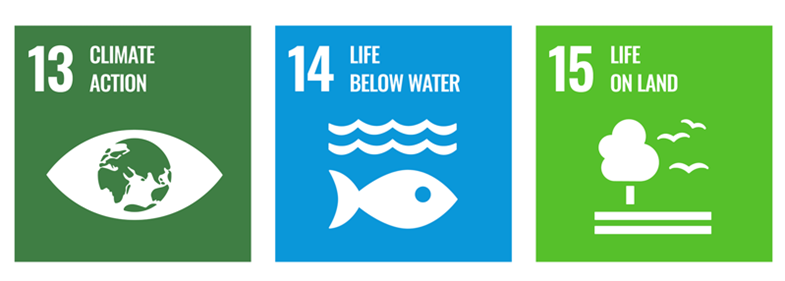International Co-Learning Practice in Science and Technology
In today's complex and interconnected world, collaborating across cultures and boundaries is more important than ever to tackle global challenges and build a sustainable society. This course is designed to bring together international and Japanese students from the School of Agriculture and Engineering who work together in teams of 4-5 members representing different countries and fields. They collaborate to identify problems, plan actions to solve them, and propose solutions for the Sustainable Development Goals (SDGs): Goal 13 (Climate Action), 14 (Life below Water), and 15 (Life on Land).

Goal13: Take urgent action to combat climate change and its impacts.
Goal14: Conserve and sustainably use the oceans, seas and marine resources.
Goal15: Sustainably manage forests, combat desertification, halt and reverse land degradation, halt biodiversity loss.
This course is an excellent example of how collaborative learning can help students develop essential skills and knowledge while addressing global issues. It offers a supportive and collaborative environment that encourages constructive engagement and prepares students to be effective problem-solvers worldwide. This course goes beyond being a global issues course; it is a transformational journey of personal growth and learning.

Collaborative Fieldwork

After attending a series of lectures about Goals 14 and 15, students go on field trips to visit two local communities facing environmental and social challenges. This visit will allow the students to witness the situations firsthand, learn from the local people, and experience Japanese culture and society. This process will enable the students to develop empathy for the challenges faced by these communities and deepen their understanding of the issues at hand.
Collaborative Group Project

After two field trips, the students will form groups to work on a project. They will use systems thinking methodology to select their project topic. Systems thinking is an effective way of understanding complex situations by looking at them as a whole and emphasizing relationships instead of individual parts. This methodology has been used to explore and carry out practical actions in complex settings, leading to transformative change. The students will engage in connections-based learning by shifting the focus from "How can we learn this?" to "Who can we learn this with?" T It encourages students to question, collaborate, and form partnerships among themselves. The goal is to equip them with the necessary skills to become responsible global citizens who can take charge of their own learning. The group project will provide students with a unique opportunity to apply the knowledge and skills they have acquired to make a positive impact on their community.
Final Group Presentation

At the end of the group project, each group will be required to deliver a final presentation. The presentations will be judged by a panel of professors from the School of Agriculture and Engineering who have previously given lectures in this course. There will be a competition among the groups, and the group with the best performance will be selected as the winner.

